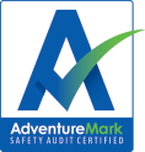THE VALUE OF EXTERNAL TECHNICAL ADVISORS
Why does my auditor keep recommending I engage with an external technical advisor?
Here’s the definition straight out of the Safety Audit Standard for Adventure Activities:
Technical adviser: Person or group of people that has professional credentials such as a high-level, nationally recognised qualification, or extensive knowledge, skills and experience to assist an operator with various technical tasks, including advising and reviewing the policies, procedures and practices relating to an activity.
An operator’s technical adviser(s) may be contracted by, or closely connected to the operator. The credentials may be achieved by combining those of two or more people, who may be staff members.
Technical advisers are mentioned several times in the Safety Audit Standard for Adventure Activities: Sections 4.2, 5.1, 10.2 & 10.3, so they must be quite important. They are. In previous articles the value of having staff with nationally recognised qualifications has often been brought up. Qualifications show that your staff have been independently assessed, that they are current with wider industry practices, etc.
What about the value of using good technical advisers?
Consider this: Jeremy has been running a quadbike operation on his farm for the last 20 years. He’s carefully groomed the track, built up berms and invested in a couple of side x sides recently. He’ll be the first to admit that he doesn’t like the paperwork side of things and honestly doesn’t understand a lot of the bureaucracy involved. During audits Jeremy explains that he was involved in establishing the initial ATV ASG in 2013 and surely meets the definition of a technical adviser. Jeremy is right, he does.
He goes on to explain that nothing has changed so why should his SMS? He still runs the trips the same way he always has and hasn’t had any incidents/ Why should he involve anyone else in his risk and hazard management or internal SMS review?
Not too far away is another quadbike operator, Jane. Jane was also involved in creating the ASG and put in some work when it was reviewed. Jane also doesn’t enjoy the paperwork aspect so every year Jane rings up a couple of other operators to see how they’re getting on, what they’ve noticed and if they’ve had any incidents. They email each other any interesting trip reports and incidents and discuss possible issues, including any new risks they’ve spotted. One operator mentions that he noticed that when they introduced side x sides people were veering off the track and it took a while to realise they needed a bit more training – we’re not used to the steering wheel being on the left of the vehicle in New Zealand! Jane and these other operators use each other as technical advisers and have a very good picture of what the wider industry is now considering good practice.
I would always recommend using external technical advisers. As a kayak instructor, if I’m teaching by myself, I’m naturally going to evolve some techniques and methods of delivery to suit my own teaching style. Over time, this could lead to quite a wide divergence from what I was taught to do (This is why staff monitoring is important, but that’s a different subject). The same concept applies for an operation; If you’re not engaging with technical advisers from outside your own operation it becomes easy to start drifting away from what the rest of the industry considers normal good practice.
All of the above is one good reason for using external technical advisers. Both Jeremy and Jane from our story above hate paperwork. They’re practical, hands-on people who know how to run a great quadbike tour and look after their customers well. Risk registers, safety objectives and monitoring legislation and guidelines are necessary evils that draws them away from the core of their operation. This is another reason to call in a technical advisor. Perhaps not another quad operator but maybe somebody who is conversant with outdoor activity safety plans – an operations manager from the big outdoor education camp over the hill, or a consultant familiar with the Adventure Activities Regulations. Let them check over your work to ensure you aren’t overlooking things that a fresh set of eyes can spot. One of our operators recently said to me: “It’s amazing how many times you look through a list and don't see what's missing.”
Lastly, please remember that a technical advisor provides advice. Just like a school teacher can't write a student's exam for the student, don't expect TAs to be responsible for your safety plans.
Audits are expensive and auditors time is a big part of that cost. If your TA can help you better understand your requirements, you could shave hours off your audit time, saving money and a lot of stress, as well!

